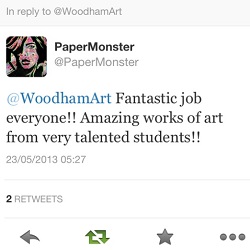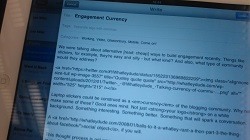Visible learning is not just about John Hattie. This is not to take away from Professor Hattie’s research, merely to say that creating visibility around student learning can redefine a learner’s understanding of the world. When in classes facilitating, I often open with the question “Do you know how many people in the world have access to the internet?” to which there are a myriad of guesses from the students. Very few get anywhere near the 3.1 billion internet users suggested by websites such as Internetlivestats.
As we March (ahem) into the spring, it is time to find sunshiny shortcuts and time-saving strategies, dear IMS-reader. The questions this month have been based around improvement and engagement. Please send in questions for next month via [email protected] for next months piece.
I have never had an original idea of my own, but that hasn't stopped me from magpieing ideas from other people to use in my classroom. I am a millennium teacher, in that I qualified in the year 2000. I’m also lucky enough to love my job and the challenge of teaching Religious Studies… I mean, if you think about it, most people remember their schooling of RS. I certainly do, and it involved distracting the teacher as much as possible through getting them to tell inane stories about their own beliefs / children / views on (insert your own choice here!).
Much has been made of how powerful blogging can be in education, by experts such as David Mitchell. But how can online writing platforms benefit teachers? English and SEN educator ‘Cazzypot’ discusses how blogging has helped her over the last couple of years.

Late in 2012, I decided I'd start writing a local history blog. Although, having been an English teacher for the last 19 years, this possibly wasn't the most logical choice. I did write one history post, but it wasn't long before I realised that I had far more to say about issues that were happening In the world of education.
Plenty of pupils love to write - why wouldn’t they? However, many of the UK’s schoolchildren have what David Mitchell, deputy head of Heathfield Primary School, aren’t getting anywhere near the audience that they should be.

As published in the September 2013 edition of our magazine.
After a grueling week with your wonderful Year 6 class surpassing their non-chronological reports, you think you have aced it! They have chosen their topic of choice, and it’s 10:50am on a Friday – it’s BIG writing time! The candle is burning… or more realistically, the interactive whiteboard is displaying the faint flicker of a candle flame. If you silence the class, you can hear the calming tones of Mozart tickling away at thought processes. It’s then, just as the children pick up their Big Writing pens that you utter those important words: “Don’t forget... consider your audience!”

The idea behind children blogging is simple: give them a platform to write for a real audience as this provides a purpose to write. When children have a purpose, it impacts on the quality of writing.
The most difficult part for teachers trying to encourage children to blog is to create an audience for children to write for. There are a few websites teachers can sign up to that will really help build an online audience. These are:
Photo credit: lupuca
Why is social media such a hotly contested topic in schools? There are many ways, as Principal Eric Sheninger explains, in which schools can harness social media and blogging to demonstrate the relevance of learning, and introduce the 'real world' audience to students.

Social Media is bad and has no place in education. It is a distraction to the teaching and learning process. If students are allowed to use social media in school they will stay off task or exhibit inappropriate behavior. Worse, teachers will spend countless hours 'socialising' instead of educating.
This is the misguided stigma that social media carries and, as a result, it is often banned in schools. However, there are a growing number of passionate educators who have embraced social media as a powerful tool for learning. When you look at how reliant the world is when it comes to using social media, these educators look like geniuses.
Photo credit: Jason A. Howie
Teachers can only offer a certain amount of motivation to students, particularly as they are usually the final destination of class and home work. With technology gaining ground in classrooms, however, there is no excuse not to enthuse students with the potential for their work to be shared with the very people that are inspiring their work - authors, artists, scientists, entrepreneurs etc. This is where the benefits of using social media in education really come into play.

After reading 'An Ethic of Excellence' by Ron Berger I was inspired to try and use his core principles to make a difference in my own school.
One of the core principles that struck me from Berger's work was his strong belief that 'to truly engage learners, there needs to be a real audience for their work'. This really rang true for me and took me back to a comment that Julia Skinner made about her fantastic work with the 100 word challenge. During a TeachMeet presentation, Julia asked us all 'how an audience of one person (us, the teacher), can be that motivating'?
If the work always stays on our desk and never goes any further, we are only just scratching the surface in terms of student motivation to do their best. Julia continues to organise a weekly 100 word challenge to engage students in writing, knowing that they'll receive 'real comments' from 'real people' through the power of blogging – hence the increased motivation coming from having a real audience.

iPads are light, have great battery life and are ultra-portable, meaning that those of you who are tired of opening and starting up your PC, laptop or notebook to write a blog have a quick and easy means of doing so.
And with blogging on-the-go becoming increasingly popular with iPad owners, it is important that people have an app that they feel comfortable with.
We scour and sort through the mass of blogging apps to bring teachers the best ones that are easy to navigate, have great support and are rich with useful features.

Over the past few weeks I've been privileged to read so many great blog posts by fellow teachers on the numerous benefits of both tweeting and blogging. Having an online presence in order to collaborate and learn from others is now fast becoming one of the most popular and interesting ways to improve your day to day teaching. More and more teachers are getting involved in this online community, which means there are more and more opportunities to network with like-minded people.
My motivation to write this post was not to re-invent the wheel, but instead to bring together the best posts that have been written on this area. It should be seen as a one-stop guide for both teachers looking to dip their toe in the online teaching community, and also the more experienced 'Tweachers' amongst us.

A community-driven platform for showcasing the latest innovations and voices in schools
Pioneer House
North Road
Ellesmere Port
CH65 1AD
United Kingdom